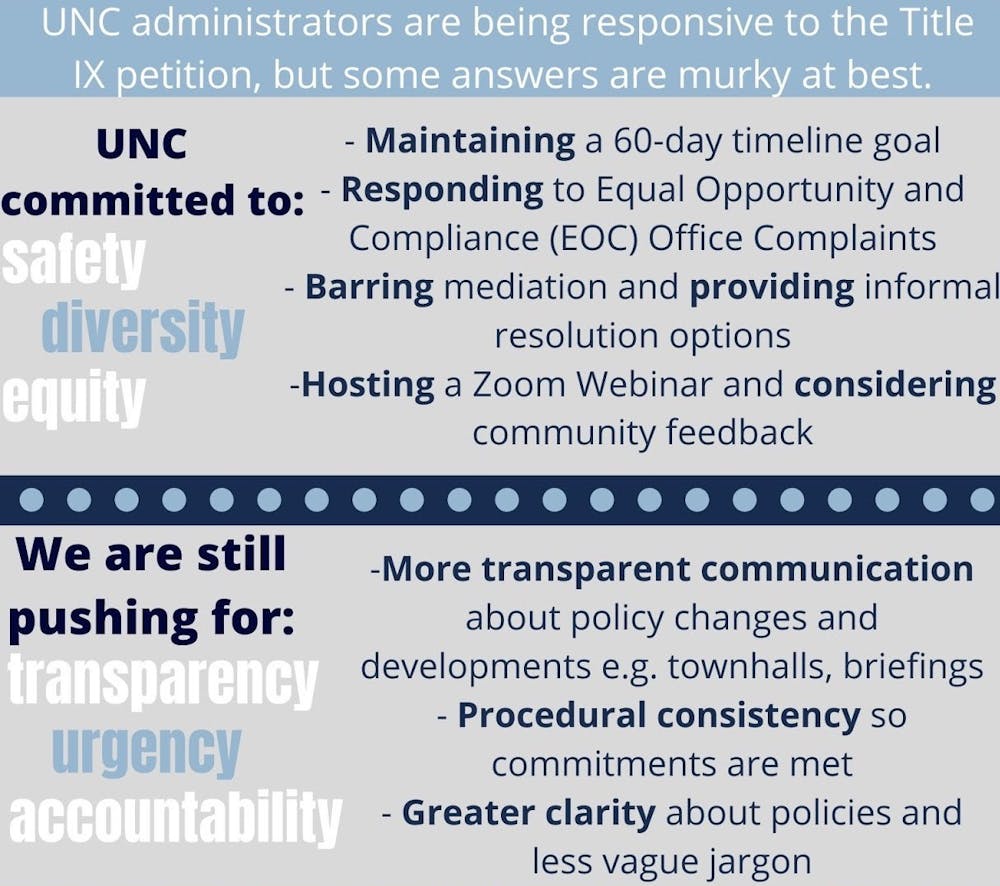On May 6, the U.S. Department of Education released a new rule rolling back the civil rights afforded to student survivors of gender violence under Title IX. The ruling applies to all schools receiving federal funding and further narrows the definition of sexual harassment and assault. Moreover, the ruling limits schools to investigate only on-campus violence — despite the fact 92 percent of sexual assaults occur off campus.
UNC has a sickening history of failed support and protection for students who have experienced abuse and has drawn national headlines year after year. Despite national scrutiny, the University has perpetuated decades of systemic failure to stop sexual violence and maintained a culture of sexual assault. According to the Association of American Universities, sexual assault has increased at UNC since 2015. More specifically, a recent AAU survey found one in three UNC undergraduate women experience non-consensual sexual touching or penetration.
I, myself, contribute to this statistic. I also stand with the hundreds of victims who have pursued recourse through Title IX but were misled and neglected by UNC’s failed implementation and enforcement of policies that are supposed to protect us. UNC lacks an effective and constructive procedure, and survivors suffer as a result.
The UNC policy is rife with opaque guidelines, subjective decision making and conflicts of interest that ultimately deter survivors from reporting and limit support options to resources like the local police department. This is alarming, as off-campus police departments are often ineffective at achieving justice for survivors. Moreover, there is a myriad of reasons why survivors, especially queer, undocumented and non-white survivors, should not be forced to turn to law enforcement due to their schools’ failures to protect them. Black women, for example, are disproportionately affected both by sexual violence and by police brutality. Interactions with police pose a greater risk of further harm for Black survivors.
It is imperative that UNC creates a cohesive and equitable Title IX process to protect the lives and rights of survivors from marginalized groups. In a moment of a national reckoning on racial injustice, UNC must adopt fair and comprehensive Title IX policies to protect marginalized survivors. Anything less is discriminatory and dangerous.
The new Title IX obligations contain dangerous provisions that tip the scales against survivors and jeopardize students’ civil right to an education free from violence. The policy changes would discourage survivors from pursuing Title IX recourse at all, resulting in a continued failure to address sexual violence, placing a disproportionate burden on marginalized students.
That said, multiple sections within the new rule give schools the discretion to choose how to implement certain policies. As such, Georgia Broitman, Salena Braye and I started a petition, garnering nearly 2,500 signatures from students and the Carolina community at large, to urge the administration to uphold the civil rights of all students on campus by adopting the safest and fairest policies legally allowed under the Final Rule.
To our surprise, the administration responded, recommitting themselves to “safety, diversity, education and equity.” The recognition of our concerns is a positive step forward, but we demand action beyond words. Although the administration was responsive to each of our demands, they left much ambiguity, vagueness, and leniency in their commitments, saying things such as “when appropriate” and “as permitted.” With decades of experience handling scandal within the Equal Opportunity and Compliance Office, we are weary of the political jargon and advisory boards often created to deter scrutiny and followed up to ask that the letter be released in full to the public.
After reviewing how the Final Rule will affect current policy, UNC plans to gather community input by hosting an explanatory Zoom webinar, creating a feedback page on the EOC website and creating a Policy Advisory Group. We urge our fellow Tar Heels to demand action, a released response and accountability for these promises.




